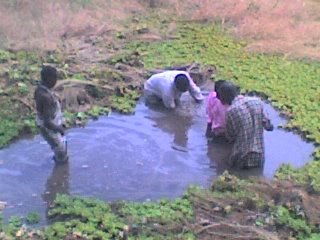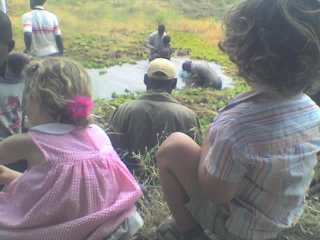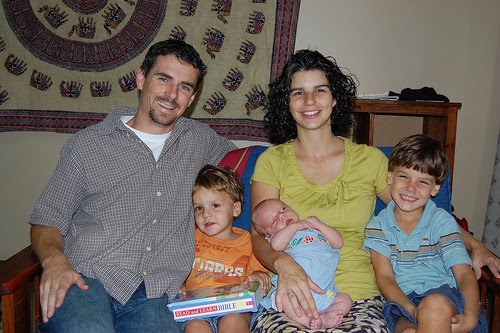Sunday in the village...
The day began under a young tree next to a small cluster of mud-brick houses. The ground was unexpectedly moist, refreshed by some unexpected thunderstorms in the middle of the dry season. About twenty people were gathered to hear the Jewish creation myth as read by my teammate and a couple teachers that he is mentoring.
People here have a better understanding of what creation stories are about; not about establishing scientific principles for debate and analysis, but rather about describing an ontological reality about who the players in our existence are, what their relationship to one another is, and how we got into the situation that we are in.
Traditionally amongst the Sukuma (and this is over-simplified), people view the creation of the world to have been the afterthought of an unconcerned god, one who is displeased with the world and wanted little interaction with the creation, so he allowed various spirits, spirits of ancestors, spirits of animals, spirits of geological features like rivers, lakes, and large rocks, to control the events of the world. Thus, people’s situation are largely assigned to fate, except for the influence of ancestral spirits which may provide some protection if they are remembered through sacrifices, or who may cause misfortune if forgotten or implored through witches to inflict harm on others.
The worldview of the audience Sunday morning was made obvious by the numerous shrines constructed around the houses, and by the shrine posted away from the houses near the main path, designed to ward off malevolent forces before they come near the living quarters. This worldview leads to fatalism, jealousy, and hopelessness, a wicked triangle of forces that leads to horrifying results.
Ironically, the story that causes so much discord in America (evidenced in the creationism/intelligent design/evolution debate for school curriculum) is a story of peace here; you can be at peace with a creator God who actually loves you, you can live in harmony with the natural world, and in community with other people, without fear or manipulation, and you can find hope in a greater purpose for existence.
So we merely shared our story, and were invited to share more. There was a man, himself a convert to this story, who lived nearby these families, who volunteered to return to share more, for which these families were grateful.
++++++++++++++++++++++++++++++++++++++++++++++++++
We drove to another place, somewhere my teammate and some Tanzanians have been sharing for weeks. This is a larger community, so we sat under a larger mango tree. This week, those who had gathered to hear the story were given the opportunity to choose a new allegiance, a new faith, a new hope. The change is so radical, so meaningful, as people accept a new worldview, that it is as thought they begin life anew.
 We utilize the same imagery that the Jewish people used over 2,000 years ago, an immersion that both symbolizes a washing away of the old, and also the rebirth into a new life. Over 100 people chose to participate together in this rebirth, from young to old, men and women alike. We walked together to a small pond, passing the others that had already gone dry. Josiah sat by my side, watching people enter into the “baptism hole”, as he called it. We watched the rebirth, not of individuals, but of a community, with different values (men and women both equally carrying the image of God, for example), different hopes, different dreams, a different future.
We utilize the same imagery that the Jewish people used over 2,000 years ago, an immersion that both symbolizes a washing away of the old, and also the rebirth into a new life. Over 100 people chose to participate together in this rebirth, from young to old, men and women alike. We walked together to a small pond, passing the others that had already gone dry. Josiah sat by my side, watching people enter into the “baptism hole”, as he called it. We watched the rebirth, not of individuals, but of a community, with different values (men and women both equally carrying the image of God, for example), different hopes, different dreams, a different future.
Of course, worldview shift is no easier for people here than it is for people anywhere else. People will not immediately give up beating their wives, they will continue to fear the spirits and ancestors, it will be many months—even years—before people start believe that there are ways in which they can better their situation (that is, their food production is not merely a product of fate, but that things like irrigation, composting, and partnering crops can make a real difference). But this community, those assembled under the tree, have chosen a new trajectory. They are a new outpost of God’s kingdom, representing his values, expressing his love, embodying his hope. My own excitement pales in comparison with the old men emerging from the water, people who have lived through colonial rule, independence, socialist policies, and countless government schemes, and for the first time have found hope.
+++++++++++++++++++++++++++++++++++++++++++++++
Storm clouds were forming all day long. Early in the day, Josiah commented that God was going to water the plants. Later, on the long, bumpy drive home, after hours under trees, much walking, and overwhelming hospitality (Josiah ate up the beans and rice!), he looked out his window, saw rain falling over the plain, and said, “God is filling up the baptism holes”. For me, at least, it puts some things in perspective.

The day began under a young tree next to a small cluster of mud-brick houses. The ground was unexpectedly moist, refreshed by some unexpected thunderstorms in the middle of the dry season. About twenty people were gathered to hear the Jewish creation myth as read by my teammate and a couple teachers that he is mentoring.
People here have a better understanding of what creation stories are about; not about establishing scientific principles for debate and analysis, but rather about describing an ontological reality about who the players in our existence are, what their relationship to one another is, and how we got into the situation that we are in.
Traditionally amongst the Sukuma (and this is over-simplified), people view the creation of the world to have been the afterthought of an unconcerned god, one who is displeased with the world and wanted little interaction with the creation, so he allowed various spirits, spirits of ancestors, spirits of animals, spirits of geological features like rivers, lakes, and large rocks, to control the events of the world. Thus, people’s situation are largely assigned to fate, except for the influence of ancestral spirits which may provide some protection if they are remembered through sacrifices, or who may cause misfortune if forgotten or implored through witches to inflict harm on others.
The worldview of the audience Sunday morning was made obvious by the numerous shrines constructed around the houses, and by the shrine posted away from the houses near the main path, designed to ward off malevolent forces before they come near the living quarters. This worldview leads to fatalism, jealousy, and hopelessness, a wicked triangle of forces that leads to horrifying results.
Ironically, the story that causes so much discord in America (evidenced in the creationism/intelligent design/evolution debate for school curriculum) is a story of peace here; you can be at peace with a creator God who actually loves you, you can live in harmony with the natural world, and in community with other people, without fear or manipulation, and you can find hope in a greater purpose for existence.
So we merely shared our story, and were invited to share more. There was a man, himself a convert to this story, who lived nearby these families, who volunteered to return to share more, for which these families were grateful.
++++++++++++++++++++++++++++++++++++++++++++++++++
We drove to another place, somewhere my teammate and some Tanzanians have been sharing for weeks. This is a larger community, so we sat under a larger mango tree. This week, those who had gathered to hear the story were given the opportunity to choose a new allegiance, a new faith, a new hope. The change is so radical, so meaningful, as people accept a new worldview, that it is as thought they begin life anew.
 We utilize the same imagery that the Jewish people used over 2,000 years ago, an immersion that both symbolizes a washing away of the old, and also the rebirth into a new life. Over 100 people chose to participate together in this rebirth, from young to old, men and women alike. We walked together to a small pond, passing the others that had already gone dry. Josiah sat by my side, watching people enter into the “baptism hole”, as he called it. We watched the rebirth, not of individuals, but of a community, with different values (men and women both equally carrying the image of God, for example), different hopes, different dreams, a different future.
We utilize the same imagery that the Jewish people used over 2,000 years ago, an immersion that both symbolizes a washing away of the old, and also the rebirth into a new life. Over 100 people chose to participate together in this rebirth, from young to old, men and women alike. We walked together to a small pond, passing the others that had already gone dry. Josiah sat by my side, watching people enter into the “baptism hole”, as he called it. We watched the rebirth, not of individuals, but of a community, with different values (men and women both equally carrying the image of God, for example), different hopes, different dreams, a different future.Of course, worldview shift is no easier for people here than it is for people anywhere else. People will not immediately give up beating their wives, they will continue to fear the spirits and ancestors, it will be many months—even years—before people start believe that there are ways in which they can better their situation (that is, their food production is not merely a product of fate, but that things like irrigation, composting, and partnering crops can make a real difference). But this community, those assembled under the tree, have chosen a new trajectory. They are a new outpost of God’s kingdom, representing his values, expressing his love, embodying his hope. My own excitement pales in comparison with the old men emerging from the water, people who have lived through colonial rule, independence, socialist policies, and countless government schemes, and for the first time have found hope.
+++++++++++++++++++++++++++++++++++++++++++++++
Storm clouds were forming all day long. Early in the day, Josiah commented that God was going to water the plants. Later, on the long, bumpy drive home, after hours under trees, much walking, and overwhelming hospitality (Josiah ate up the beans and rice!), he looked out his window, saw rain falling over the plain, and said, “God is filling up the baptism holes”. For me, at least, it puts some things in perspective.



1 Comments:
Many times my soul is parched and God sends rain in the desert. What wonderful teachable moments with Josiah. Thank you, Kevin, for sharing your stories with us.
Post a Comment
<< Home